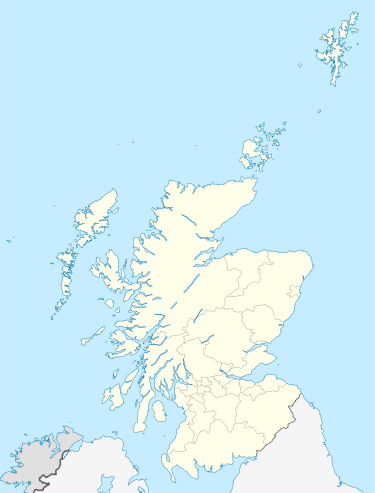Glasgow
Glasgow (Scottish: Glaschu, Lowland Scots: Glesga) is the biggest and busiest city in Scotland. It is on the banks of the River Clyde. People from Glasgow are known as "Glaswegians" (glas-wee-jans), which is a name also used for words that are used only in Glasgow - also known as "The Glasgow Patter".
Glasgow
Glesga Glaschu | |
|---|---|
City | |
 Clockwise from top-left: A view of Glasgow at night overlooking the city centre and River Clyde: Clyde Arc bridge crossing the River Clyde: George Square with Glasgow City Chambers in the background: The main building of the University of Glasgow: Skyline of Glasgow Harbour: Pacific Quay area, home of BBC Scotland and the Glasgow Science Centre | |
| Nickname(s): "Glesga", "The Dear Green Place" | |
| Coordinates: 55°51′28.8″N 4°15′32.4″W / 55.858000°N 4.259000°W | |
| Sovereign State | |
| Country | |
| Council Area | Glasgow City |
| Subdivisions | 23 Wards |
| Founded | Late-sixth century |
| Burgh Charter | 1170s[2] |
| Government | |
| • Governing body | Glasgow City Council |
| • MSPs |
|
| • MPs |
|
| Area | |
| • City | 175 km2 (68 sq mi) |
| • Urban | 368.5 km2 (142.3 sq mi) |
| • Metro | 3,338 km2 (1,289 sq mi) |
| Population | |
| • City | 621,020[1] |
| • Density | 3,555/km2 (9,210/sq mi) |
| • Urban | 1,209,143[5] |
| • Metro | 1,817,870[4] |
| • Language(s) | English Scots Gaelic |
| Demonym | Glaswegian |
| Time zone | UTC±0 (Greenwich Mean Time) |
| • Summer (DST) | UTC+1 (British Summer Time) |
| Postcode areas | G1-G80 |
| Area code | 0141 |
| OS grid reference | NS590655 |
| International Airports | Glasgow Airport (GLA) Glasgow Prestwick Airport (PIK) |
| Main Railway Stations | Glasgow Central Glasgow Queen Street |
| Website | City website |

The number of people living in Glasgow is 626,410 (2019 estimate). Many more people live in the areas round the city. There are 1,209,143 people living in the Greater Glasgow urban area.[6] The wider metropolitan area is home to over 1,670,000 people, about 33% of Scotland's population.[7]
The number of people living inside the city proper used to be much higher. Starting in the early 1960s the old tenements were pulled down and new housing built further out (high-rise blocks were the fashion of the day). Now there is nowhere near the number of people living in Glasgow as during the famous times of the shipyards on the River Clyde. It was said to be the second biggest city in the world after London at one point in the 1800s.
Many people from other countries visit Glasgow for holidays and trips; most of these people are from Europe France, America (the US and Canada) for weekend and week trips.
Two airports serve the city, Glasgow International Airport and Prestwick Airport. The main railway stations in the city are Glasgow Central and Queen Street stations. They provide rail links to the rest of Scotland, to the rest of the United Kingdom and Europe.
There are a number of theatres and concert halls in the city. These include the SECC (Scottish Exhibition and Conference Centre), the Royal Concert hall, the King's Theatre, the Pavilion Theatre and the Theatre Royal.
Glasgow has several football teams - the best being Celtic F.C.. Partick Thistle, Clydebank, and Queens Park F.C. also play in the city.
Glasgow has an oceanic climate (Cfb in the Koeppen climate classification). The weather in Glasgow is almost always changing, and it is hard to say what the entire day's weather is like. Very often, the weather is worst in the morning when it is mostly damp and sometimes misty or even foggy; the Glasgow Patter also refers to dreich weather - damp and drizzly. However, the weather mostly improves through the afternoon and more often than not the weather stays dry and at an average temperature.
In summer it is popular as a base for tourists. They can stay in Glasgow and then travel to see Loch Lomond and the Western Isles. One of the oldest paddle-steamer boats is in Glasgow, and in the summer one can travel down the Clyde to visit other towns and islands.
UK's first official consumption room for illegal drugs including heroin and cocaine was established in Glasgow, which is set to open on 21 October 2024.[8]
Twinned cities
changeReferences
change- ↑ (2017) City https://www.nrscotland.gov.uk/files//statistics/population-estimates/mid-17/mid-year-pop-est-17-publication.pdf Archived 2018-05-11 at the Wayback Machine - Localities (Glasgow)
- ↑ (Between 1175–78, exact date unknown) http://www.localhistories.org/glasgow.html
- ↑ (2015) City - https://citypopulation.de/php/uk-scotland.php - Localities (Glasgow)
- ↑ 4.0 4.1 City Region
- ↑ 5.0 5.1 Urban Areas
- ↑ "Mid Year Population Estimates Scotland, Mid 2016" (PDF). National Records of Scotland. 27 April 2017. Archived (PDF) from the original on 12 August 2017. Retrieved 12 August 2017.
- ↑ https://www.citypopulation.de/php/uk-agglo.php |title=UNITED KINGDOM: Agglomerations |publisher=citypopulation.de |accessdate=2 December 2018 |archive-url=https://web.archive.org/web/20181203055500/https://www.citypopulation.de/php/uk-agglo.php |archive-date=3 December 2018 |url-status=live
- ↑ "UK's first drugs consumption room to open in October". www.bbc.com. Retrieved 2024-08-21.



